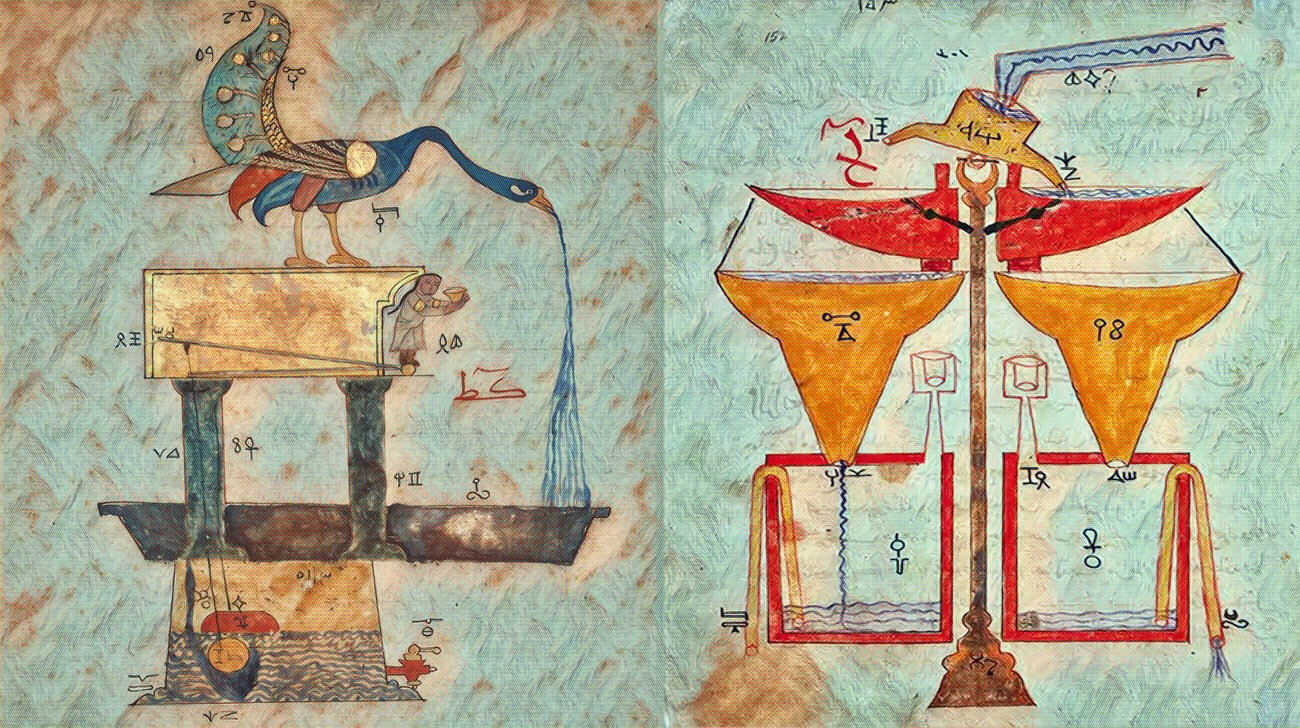Today, most of the modern world has become familiar with robots. Part of this global development in the field of robots revolves around the concept of automation. This in turn, began with the mechanization of manufacturing during the Industrial Revolution in the 18th century.
And while robotics is considered a relatively new field of science, with the public's consensus that it is the creation of 20th-century scientists, it would be surprising to know that the field has its roots in the medieval era nearly a millennium ago.
One of the most important medieval figures within the field was Badi-az- Zaman al Jazari. Al-Jazari, a Muslim scholar, mathematician, engineer, and above all, an innovator was born in Jazaria [in modern-day Turkey] during the Artuqid Dynasty, he was famous for creating ingenious pre-modern robots controlled by various hydraulic-gear systems. He invented many devices that were precursors to today's robots, and his knowledge of automation in the 12th century inspired several generations of scientists.
Within his various books, Al-Jazari gave step-by-step instructions about building many of these machines and devices. His books contain an invaluable store of knowledge about early Muslim engineering. Unlike other peers of his time, they were unique because he had meticulously described each detail of his machines. Moreover, these instructions were so well organized that many future craftsmen were able to build upon his mechanical creations without much difficulty.
In his most famous work, "The Book of Knowledge of Ingenious Mechanical Devices (Kitab fi ma'rifat)," written in 1206, Al- Jazari meticulously detailed the blueprints of over 100 mechanical devices. These devices included but were not limited to clocks, fountains, hand-washing devices, musical instruments, automated moving peacocks, and gates.
Detailed within this work was Al Jazari's most famous creation, an Elephant Water Clock. This clock consisted of a weight-powered water clock in the form of an ancient elephant. The various elements of this clock were located on the top of the elephant seat, known as howdah. The timing mechanism was based upon the filling of a water-filled basin hidden inside the elephant's belly. Through an ingenious system of hydropower and gravity, time was able to be tracked.
Numerous reproductions of the Elephant Clock have been created by the "1001 Inventions" organization in London as well as in the Ibn Battuta shopping mall in Dubai, United Arab Emirates. Other reproductions are located within the Musée d'Horlogerie du Locle in Le Locle, Switzerland, the Museum of Science and Technology in Islam in Saudi Arabia, and in Kasmiye Madrese, Mardin, Turkey.
Some of Al-Jazari's contraptions were so modern in appearance and ability that it is hard to believe that they were built eight centuries ago. One such example of this is the creation of an automated waitress serving drinks. Through a reservoir, various drinks were able to be served on a timed basis in a drip system. He also described building hand-washing devices to perform ablution, a peacock fountain in which automated servants would offer soap and towels to guests when they are done with washing their hands. In many of his creations, Al-Jazari utilized a system of pulleys, levers, and weight to build his devices. He demonstrated ingenuity and a level of skill that is well-respected, even today.

The impact of these inventions paved the way for modern machinery and can be seen in the later designs of the steam engine and internal combustion engine.
However, not all of Al-Jazari's inventions were serious in nature. Some of his inventions were used for entertainment and even comical purposes. He designed trick vessels that appeared to have water in them but when someone tried to drink out of them, they were empty.
One of the most fascinating devices al-Jazari created was a musical automaton, which consisted of a boat with four automatic musicians that floated on a lake to entertain guests at royal parties. A notable Professor, Noel Sharkey [Director of the Foundation for Responsible Robotics] has even commented that this creation was one of the first automata-related devices that were programmed. This is due in part to the ability of the drummer to play different rhythms and drum patterns if certain pegs were moved around. This device is so remarkable that Professor Sharkey has refuted that Leonardo da Vinci created the first programmable robot/automata in the 15th century, in favor of Al-Jazari.
In 1974, eight centuries after the death of Al-Jazari the British historian Donald Hill translated Al-Jazari's book from Arabic to English. Hill realized that various engineering techniques utilized by Jazari were later reproduced by European inventors, thereby illustrating Al-Jazari's far-reaching legacy. It is impossible to overemphasize the importance of Al-Jazari's work in the history of engineering, as it [according to Hill], "provides a wealth of instructions for design, manufacture, and assembly of machines" (Hill). Al-Jazari's work is truly a testament to the impact of Muslim thought and innovation seen today in the modern world.
Al- Jazari's legacy and life's work in many ways are overlooked, as many [within the scientific community] have never given enough due credit to Jazari's feats in engineering and mechanics. Yet it is perhaps his innovation in robotics that should be highlighted the most. The modern world has yet to comprehend the depth of Muslim scientific development still influencing today's age.
According to Marcus Garvey, a Jamaican political activist, "A people without the knowledge of their past history, origin and culture is like a tree without roots." This is a call to action for all of us to enlighten the world of the contribution of Muslim innovators, scholars, and thinkers to world civilization.References: